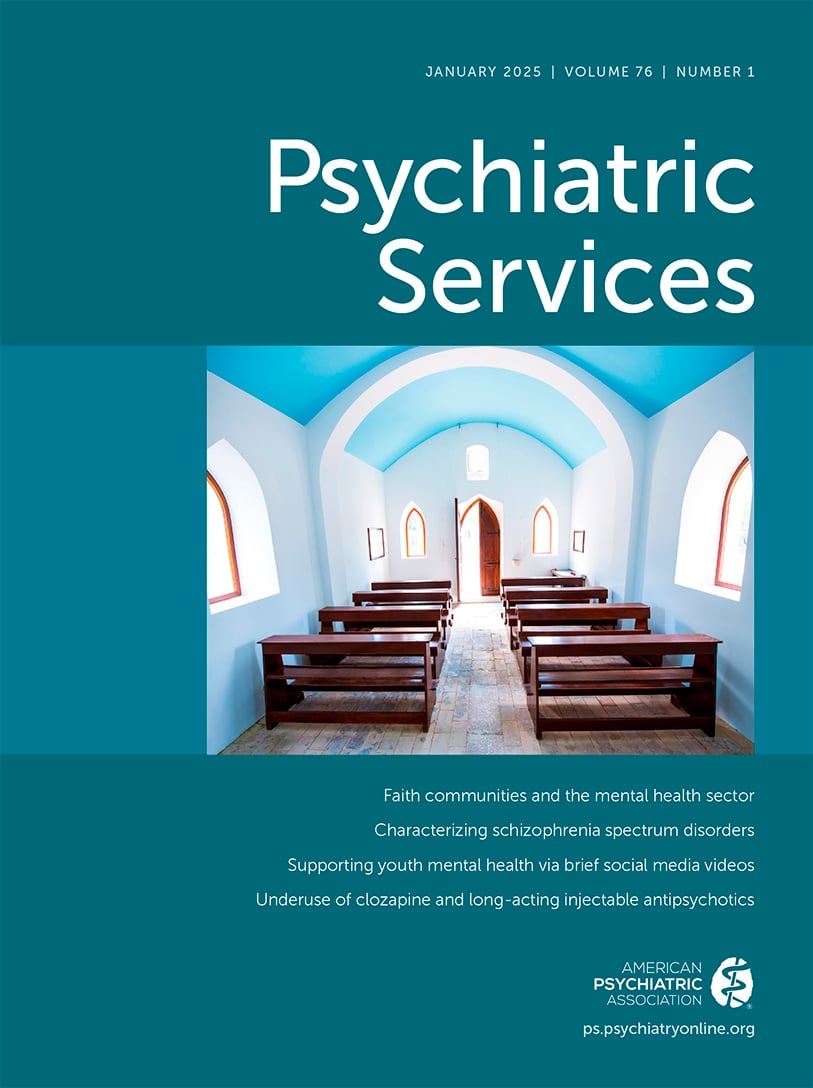Psychiatric Services
- Volume 37
- Number 3
- March 1986
Article
Publication date: 01 March 1986
Pages227–229Dr. Sharfstein's Introduction: As the rules of reimbursement are being rewritten, it is important that psychiatrists create clinical innovations that make sense from both an economic and a quality-of-care perspective. The psychiatric short procedure unit ...
https://doi.org/10.1176/ps.37.3.227Publication date: 01 March 1986
Pages241–249The signs and symptoms of response to a stressful life event are expressed in two predominant phases: the intrusive state, characterized by unbidden ideas and feelings and even compulsive actions, and the denial state, characterized by emotional numbing ...
https://doi.org/10.1176/ps.37.3.241Publication date: 01 March 1986
Pages249–252The authors compared the responses on the Family Environment Scale of 12 schizophrenic inpatients who had been hospitalized more than three times in the previous 12 months and a control group of 12 similarly diagnosed inpatients who had been admitted less ...
https://doi.org/10.1176/ps.37.3.249Publication date: 01 March 1986
Pages253–256Family groups are becoming increasingly active in providing support to family members and in mental health advocacy. The authors report the results of a survey that assessed the concerns of members of the California Alliance for the Mentally Ill and the ...
https://doi.org/10.1176/ps.37.3.253Publication date: 01 March 1986
Pages256–260Although the vast majority of chronic mentally ill patients now live in the community, most of the funds for mental health services have remained in the budgets of large state institutions. As a result, adequate community support systems have not been ...
https://doi.org/10.1176/ps.37.3.256Publication date: 01 March 1986
Pages261–264The authors developed a statistically based method for determining whether inpatient or outpatient placement is most appropriate for a given patient. This study assesses the method's accuracy by comparing statistical classifications of a random sample of ...
https://doi.org/10.1176/ps.37.3.261Publication date: 01 March 1986
Pages265–268To explore the concept of the young adult chronic patient as a distinct clinical entity, the author analyzed a sample of 134 chronic patients on six variables relating to style of interaction with service providers and on diagnostic and demographic ...
https://doi.org/10.1176/ps.37.3.265Publication date: 01 March 1986
Pages269–272A reanalysis of data from the 1977 National Nursing Home Survey, including data not available earlier, led to an estimate that 668,000 chronic mentally ill patients reside in nursing homes. Several subpopulations of nursing home residents were also ...
https://doi.org/10.1176/ps.37.3.269Publication date: 01 March 1986
Pages273–279In 1980 the authors reviewed the records of the first 130 patients to enter small group work therapy, a program begun in 1964 by Arkansas State Hospital and Arkansas Rehabilitation Services in which chronic schizophrenic patients live in group homes and ...
https://doi.org/10.1176/ps.37.3.273Publication date: 01 March 1986
Pages280–282The U.S.S.R. has established a graduated, differentiated system of psychiatric care based on psychoneurological dispensaries—a type of outpatient clinic—that are linked to mental hospitals or regular district (general) hospitals. Treatment is based on a ...
https://doi.org/10.1176/ps.37.3.280Publication date: 01 March 1986
Pages283–286Following a review of several studies of homeless populations, the authors describe a survey of 68 homeless adults in eight urban emergency shelters in Hennepin County, Minnesota. The results indicated impressive rates of mental illness, alcoholism, minor ...
https://doi.org/10.1176/ps.37.3.283Publication date: 01 March 1986
Pages287–288Sheet packs have proven to be useful in treating extremely agitated patients who cannot take medication, as a substitute for seclusion or other types of restraint, and with patients who continue to be destructive despite use of medication and seclusion. ...
https://doi.org/10.1176/ps.37.3.287Publication date: 01 March 1986
Pages289–291The findings of our study support previous reports documenting a high rate of chronic medical illness among the chronic mentally ill. More than 42 percent of CSP clients were reported to have at least one chronic medical problem severe enough to limit ...
https://doi.org/10.1176/ps.37.3.289Past Issues
View Issues Archive
Vol. 76 | No. 1

Vol. 75 | No. 12

Vol. 75 | No. 11
